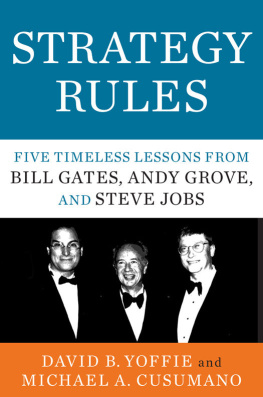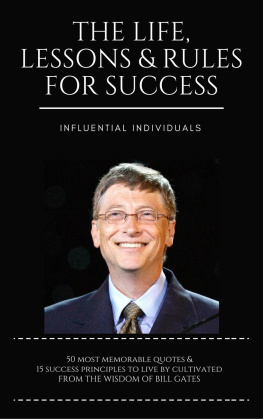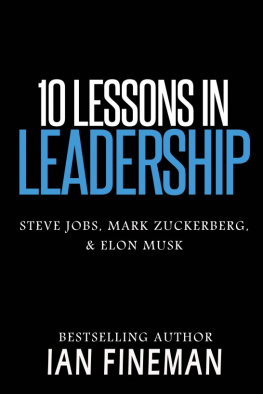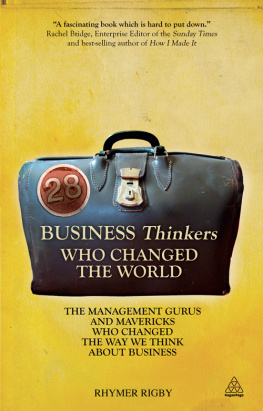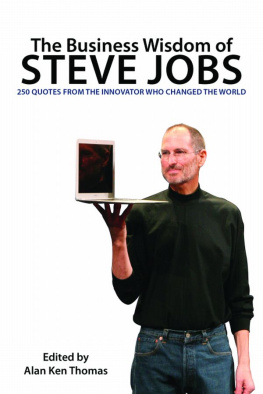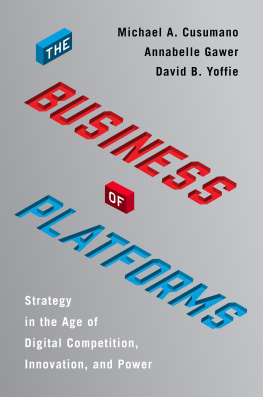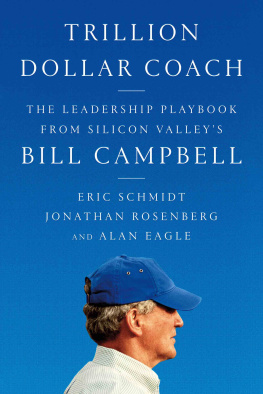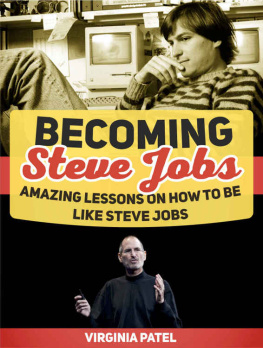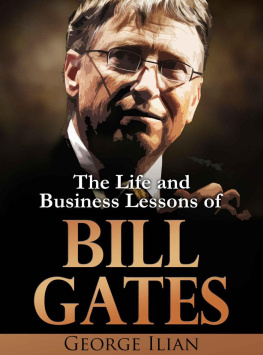
D avid would like to dedicate this book to Andy Grovementor, critic, friend, and leader who inspired me to never give up and always try harder.
M ichael would like to dedicate this book to both Xiaohua and Pico, who keep me focused on the future.
CONTENTS
Guide
W e have been teaching strategy at Harvard and the Massachusetts Institute of Technology for almost thirty years. Over the past three decades, the field of strategy has made enormous progress in delivering rigorous, analytical frameworks, usually rooted in academic disciplines such as microeconomics, game theory, and sociology. While we provide students with numerous tools, we rarely talk about how great strategists think, learn, and put ideas together with actions. There is a deep hole in our understanding about what makes a truly great strategist. Academics frequently study companies and their leaders, but they rarely study in depth the individuals themselves, along with the decisions that define their careers and the organizations they build.
When we began this project, we made several important assumptions. One was that managers and entrepreneurs could learn a great deal from Bill Gates, Andy Grove, and Steve Jobs, despite their uniqueness and larger-than-life personalities. There was never any question in our minds that these three individuals were not your typical CEOs or entrepreneurs in terms of personal abilities or achievements. They were titans of industry, to say the least. At the same time, we concluded that their approaches could help managers and entrepreneurs think more systematically about strategy, as well as execution, because they tackled key problems in similar ways.
A second assumption was that, even though all three of our subjects were from the world of high technology, their experience can give us great insight into the role and importance of strategy and execution for many types of businesses. One of the reasons we have spent so much of our careers studying high-tech firms is that the pace of change puts an enormous premium on formulating the right strategy at the right time, as well as attending to the details of execution. In addition, quickly evolving technologies are becoming embedded in every business today. Rapid changes in social media, cloud computing, mobile devices, and even wearable technology will impact most firms over the next few decades. Understanding how strategy develops in the high-tech world has become part of everyday business life.
A third assumption is that strategy and execution are inextricably linked. When we are teaching, students often ask, Whats more important, strategy or execution? After a brief pause, we usually respond with another question: What would you rather havea great strategy that is poorly executed or a bad strategy that is executed perfectly? The answer, of course, is neither. There is no value in a great strategy that you cant execute or great execution that leads you in the wrong direction. Skillful CEOs must set the organization on the right path and then lead their organizations to deliver results. As Bill Gates once said, A bad strategy will fail no matter how good your information is and lame execution will stymie a good strategy. If you do enough things poorly, you will go out of business.
Finally, we believe that becoming a great strategist is not innate. Most successful executives learn over time how to think more strategically and how to execute more effectively, at the tactical and organizational levels. We return to this theme in the books concluding chapter. In the meantime, we will show that Bill Gates, Andy Grove, and Steve Jobs were not born as great strategists: Jobs almost bankrupted the company during his first stint with Apple; Groves first publication on how to run a business, High Output Management, was the quintessential guide to being an operations-oriented middle manager; and Gatess knowledge of management and business strategy when he dropped out of Harvard was hardly impressive. It was their ability to learnabout strategy, execution, and new domains within their own businessesthat made them such effective leaders over such long periods of time. We assume that other senior managers and entrepreneurs, if they put their minds to it, can learn these skills as well.
In many ways, the research on this book started in the mid-1980s, when we began studying, writing about, or working in the software, computer, and semiconductor industries. We have incorporated interviews conducted at the three companies dating back to 1987. In total, we have relied on some one hundred of our own interviews in different years, as well as on other books, articles, and cases we and others have written. We also spent approximately a year meeting a few times per month to compare ideas on our three subjects and lay out the structure of the book before we started writing. The current framework of five main rules and skill sets that we thought the three CEOs shared emerged in the first few days of our discussions, reinforcing our belief that Gates, Grove, and Jobs shared much in common with regard to how they approached strategic challenges.
While we have already thanked many of the individuals who have helped us in our research over the past two decades, we would like to express here our appreciation to the executives who gave us their time and perspectives during the fall of 2013, when we undertook the most current research. First and foremost, we want to thank Andy Grove. Andy met with us several times between September 2013 and July 2014. He read and commented on parts of the manuscript, as well as answered numerous emails. Besides Grove, we approached Bill Gates who, in late fall 2013, apologized for not being available.
Our interview strategy, with two exceptions, was to talk with executives who had worked closely with Gates, Grove, and Jobs, but no longer worked for their respective companies. We did not want to put anyone in an awkward position. The exceptions were Rene James, who worked for five years as Groves technical assistant and was Intels new president at the time of our meeting, and Joel Podolny, Apples head of human resources, who worked with David at Harvard Business School before going to Yale and then Apple. In addition to meeting with Grove, James, and Podolny, we did twelve additional interviews in the fall of 2013: we wish to thank Fred Anderson, Dennis Carter, Tom Dunlap, Carl Everett, Pat Gelsinger, Frank Gill, Ron Johnson, Paul Maritz, Jon Rubinstein, Russ Siegelman, Avie Tevanian, and Les Vadasz.
We have also benefited greatly from numerous readers of the manuscript and others who provided written feedback on our seminars. These include our agent, James Levine; the publisher, Hollis Heimbouch; and Juan Alcacer, Deborah Ancona, Ankur Chavda, Scott Cook, Donna Dubinsky, Kathy Eisenhardt, Andreas Goeldi, Mel Horwitch, Reed Hundt, Rene James, Carol Kauffman, Karim Lakhani, Doug Melamed, Sanjiv Mirchandani, Tim Ott, Joel Podolny, Alec Ramsay, Steven Sinofsky, Brad Smith, Michael Scott-Morton, Ben Slivka, Richard Tedlow, and Eric Van den Stein. We also thank participants in seminars at Stanford Engineerings Department of Management Science and Engineering, London Business School, Imperial College Business School, Oxfords Sad Business School, the Harvard Business School Strategy Conference and HBS Strategy Seminar, and the MIT Sloan Seminar in Technological Innovation, Entrepreneurship, and Strategy.
A few individuals were indispensable: Eric Baldwin was Davids research associate, who dug into every aspect of the research, looking for new examples, insights, references, and perspectives to help us with every chapter in the book. We are deeply indebted to our editor, Mary Kwak, who pushed us to clarify our thinking, and played a crucial role in making the book more readable for a broader audience. Davids assistant, Cathyjean Gustafson, was incredibly supportive at every stage of the process.
Next page
